Is Russia behind Hamas attack on Israel? What we know

The stunningly successful surprise attack launched by Hamas from the Gaza Strip into southern Israel at the weekend has opened a dark new chapter in the years-long war between the Islamist militant group and its Israeli enemies.
Amid swirling speculation of foreign involvement, the infiltration attack—being referred to by some observers as "Israel's 9/11"—may yet precipitate seismic shifts in Israel's foreign affairs.
Hamas justified "Operation Al-Aqsa Flood" as a response to Israel's recent police actions in the Al-Aqsa Mosque compound in Jerusalem and to violence by Israeli settlers illegally occupying parts of the Palestinian West Bank.
The operation is believed to have killed at least 700 Israelis, wounded more than 2,100, and resulted in dozens of captives being taken back into the Gaza Strip. Israel's response is underway, with airstrikes in Gaza killing at least 413 people, according to the Palestinian Health Ministry.
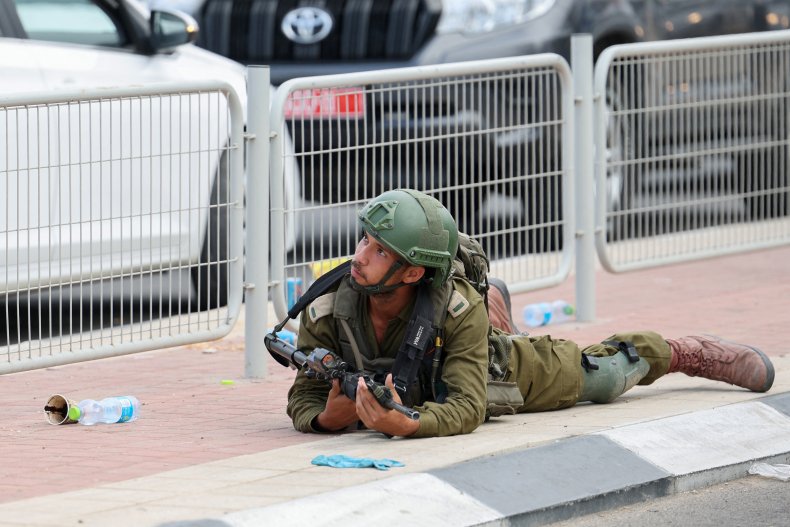
Israelis are now considering how the country was caught so catastrophically off guard as speculation mounts of foreign backing for the raid.
Hamas has long been funded, armed and trained by Iran, as one of the Islamist militant organizations—alongside Islamic Jihad also in Gaza, Lebanese Hezbollah, the Houthis in Yemen, and a litany of Shia paramilitary formations in Iraq—leveraged by Tehran in its strategic confrontation with Israel and its Western backers.
The weekend attack appears to have thwarted—or at least delayed—the planned normalization deal between Israel and Saudi Arabia; a key strategic goal for Tehran.
Initial reports—and a statement from Hamas—suggest that Iran had a hand in the landmark assault, which is thought to have been prepared over several weeks. Secretary of State Antony Blinken, though, said on Sunday he has "not yet seen evidence that Iran directed or was behind this particular attack, but there is certainly a long relationship." Iran's mission to the United Nations has denied any involvement.
There has also been speculation on social media of Russian involvement in the Hamas operation, though there is no evidence indicating Moscow's alleged role. Newsweek has contacted the Russian foreign ministry by email to request comment.
The Institute for the Study of War has suggested that Russia might benefit from the shift in international attention away from its atrocities in Ukraine and towards the deteriorating situation in Israel and the Palestinian territories. Israel is expected to launch a fresh and bloody ground assault into Gaza in the coming days, while tensions remain high in the occupied West Bank and along the border with Lebanon, where Hezbollah enjoys de facto control.
Regardless, there is no evidence of direct Russian involvement in the weekend attack. Hamas has controlled the Gaza Strip since 2007 and has a long history of infiltration operations into Israeli territory. The militants appear to have used their traditional mixture of indigenous and Iranian weapons for the assault.
Some pro-Ukrainian accounts on X, formerly known as Twitter, claimed without evidence that the Wagner Group mercenary organization may have trained the Hamas units that launched the attack. Wagner has no known presence in the Palestinian territories, while Hamas' assault units are highly experienced and trained with the assistance of outside powers like Iran.
Others incorrectly suggested that only Russia could have instructed Hamas in its use of drone bombers to target Israeli armor and observation posts. Hamas was at the forefront of the adoption of commercial and military drones, and has regularly used them to attack Israeli military, civilian and infrastructure targets in Israel and the Gaza Strip.
Oleg Ignatov, the Crisis Group think tank's senior Russia analyst, told Newsweek: "I haven't seen any evidence; I haven't seen it in public, I haven't heard anything about this from my conversations. It's difficult to imagine that Russia participated in the planning of this attack.
"Of course, we live in a world where we can't exclude anything. But I haven't seen any evidence."
Russia has long maintained a close working relationship with Iran and its network of partner militant organizations—especially Hezbollah in Lebanon—across the Middle East, seeing them as an alternative power base capable of challenging regional American and allied interests. Moscow has drawn closer to Iran since the Kremlin launched its full-scale invasion of Ukraine in February 2022.
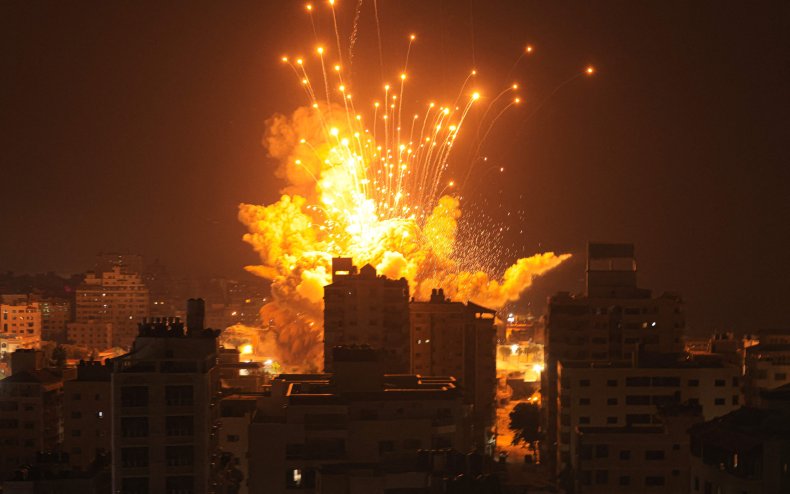
The Kremlin has retained high-level contacts with Hamas. In March, the militant group sent a high-level delegation to Moscow to hold talks with Russian Foreign Minister Sergei Lavrov, who subsequently warned that Hamas' "patience" with Israel was "running out." Hamas leaders also visited Russia in May and September 2022.
Such diplomatic channels should not be confused with direct support, Ignatov said. "Russia has very good connections with Hamas, and everybody knows about this," he said. "But I think that was part of the policy in the Middle East that it was advantageous for Russia to have the ability to communicate with everyone."
In seeking to bolster its international prestige and influence, Ignatov said Moscow is more interested in involvement in peace talks rather than trying to sway the fighting. "Russia would be interested in participating in any possible negotiations," he said. "This means, of course, it would would not be interested in supporting one of the sides."
Deputy Foreign Minister Mikhail Bogdanov was among those who called for calm over the weekend. "It goes without saying that we always call for restraint," the diplomat said, as quoted by the Interfax news agency. Former President Dmitry Medvedev—known for his anti-Ukrainian and anti-Western diatribes—took the opportunity to blame the U.S. for the broader Israeli-Palestinian conflict.
But some Russian propagandists reveled in Israel's defeat. Vladimir Solovyov said the Hamas attack was a "loud slap" for Israel and its intelligence services, blaming the U.S. for failing in its role as the "guarantor of peace in the region" and claiming without evidence that Ukraine provided weapons to Hamas.
Others used the attack to hit out at Russians who fled to Israel to escape Moscow's disastrous war on Ukraine. Margarita Simonyan, the head of RT, wrote on social media: "The country that is not at war with its neighbors is again at war with its neighbors. We await the exodus of Russian pacifists. Then again, we won't hold our breath."
Sergey Mardan wrote in a post on his Telegram channel: "This mess is beneficial for Russia, because the globalist toad will be distracted from Ukraine and will get busy trying to put out the eternal Middle Eastern fire."
"Iran is our real military ally," Marden added. "Israel is an ally of the United States. Therefore, choosing a side is easy!"
But goading from state media talking heads is not the same as foreign policy, Ignatov said. "That's not the policy, it's wishful thinking," he explained.
"They think that the world works like this. If there is a war in Israel, it means that the United States will send shells and ammunition to Israel rather than to Ukraine. And that means that Russia will have an advantage."
Update 10/9/23 at 7:35 a.m. ET: This article has been updated to include comment from Oleg Ignatov.
Mounting questions over Israel’s massive intelligence failure to anticipate and prepare for an surprise Hamas assault were compounded Monday when an Egyptian intelligence official said that Jerusalem had ignored repeated warnings that the Gaza-based terror group was planning “something big.”
The Egyptian official said Egypt, which often serves as a mediator between Israel and Hamas, had spoken repeatedly with the Israelis about “something big,” without elaborating.
He said Israeli officials were focused on the West Bank and played down the threat from Gaza. Prime Minister Benjamin Netanyahu’s government is made up of supporters of West Bank settlers who have demanded a security crackdown there in the face of a rising tide of violence over the last 18 months.
“We have warned them an explosion of the situation is coming, and very soon, and it would be big. But they underestimated such warnings,” the official, who spoke on condition of anonymity because he wasn’t authorized to discuss the content of sensitive intelligence discussions with the media, told The Associated Press.
However, Israel was not only ignoring clear warnings from its allies.
For Palestinians in Gaza, Israel’s eyes are never very far away. Surveillance drones buzz constantly in the skies. The highly secured border is awash with security cameras and soldiers on guard. Intelligence agencies work sources and cyber capabilities to draw out information.
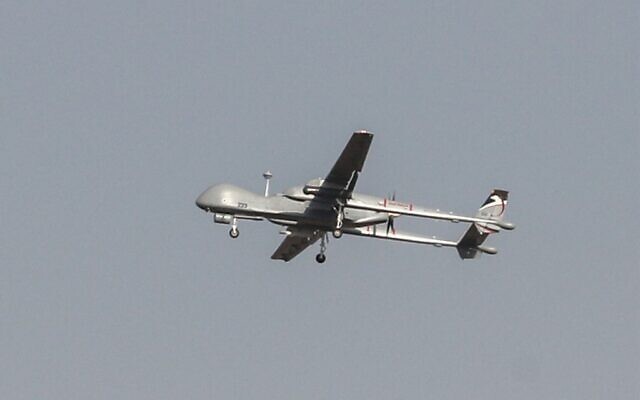
But Israel’s eyes appeared to have been closed in the lead-up to the surprise onslaught by the Hamas terror group, which broke through Israeli border barriers and sent hundreds of terrorists into Israel to carry out a brazen attack that killed over 700 people and wounded over 2,000.
Israel’s intelligence agencies have gained an aura of invincibility over the decades because of a string of achievements. Israel has foiled plots seeded in the West Bank, allegedly hunted down Hamas operatives in Dubai and has been accused of killing Iranian nuclear scientists in the heart of Iran. Even when their efforts have stumbled, agencies like the Mossad, Shin Bet and military intelligence have maintained their mystique.
But the weekend’s assault, which caught Israel off guard on a major Jewish holiday, plunges that reputation into doubt and raises questions about the country’s readiness in the face of a weaker but determined foe. Over 48 hours after the start of the attack, Hamas terrorists continued to battle Israeli forces inside Israeli territory, and over 100 Israelis were in Hamas captivity in Gaza.
“This is a major failure,” said Yaakov Amidror, a former national security adviser to Prime Minister Benjamin Netanyahu. “This operation actually proves that the [intelligence] abilities in Gaza were no good.”
Amidror declined to offer an explanation for the failure, saying lessons must be learned when the dust settles.

Rear Adm. Daniel Hagari, the chief military spokesman, acknowledged the army owes the public an explanation. But he said now is not the time. “First, we fight, then we investigate,” he said.
Some say it is too early to pin the blame solely on an intelligence failure. They point to a wave of low-level violence in the West Bank that shifted some military resources there and the political chaos roiling the country over steps by Netanyahu’s far-right government to overhaul the judiciary. The controversial plan has threatened the cohesion of the IDF, seen as the people’s army.
But the apparent lack of prior knowledge of Hamas’s plot will likely be seen as a prime culprit in the chain of events that led to the deadliest attack against Israelis in decades.
Israel withdrew troops and settlers from the Gaza Strip in 2005, stripping it of a close handle on the happenings in the territory. But even after Hamas overran Gaza in 2007, Israel appeared to maintain its edge, using technological and human intelligence.
It claimed to know the precise locations of Hamas leadership and appeared to prove it through the targeted killing of terror leaders in surgical strikes, sometimes while they slept in their bedrooms. Israel has known where to strike underground tunnels used by Hamas to ferry around fighters and arms, destroying miles (kilometers) of the concealed passageways.
Despite those abilities, Hamas was able to keep its plan under wraps. The ferocious attack, which likely took months of planning and meticulous training and involved coordination among multiple terror groups, appeared to have gone under Israel’s intelligence radar.
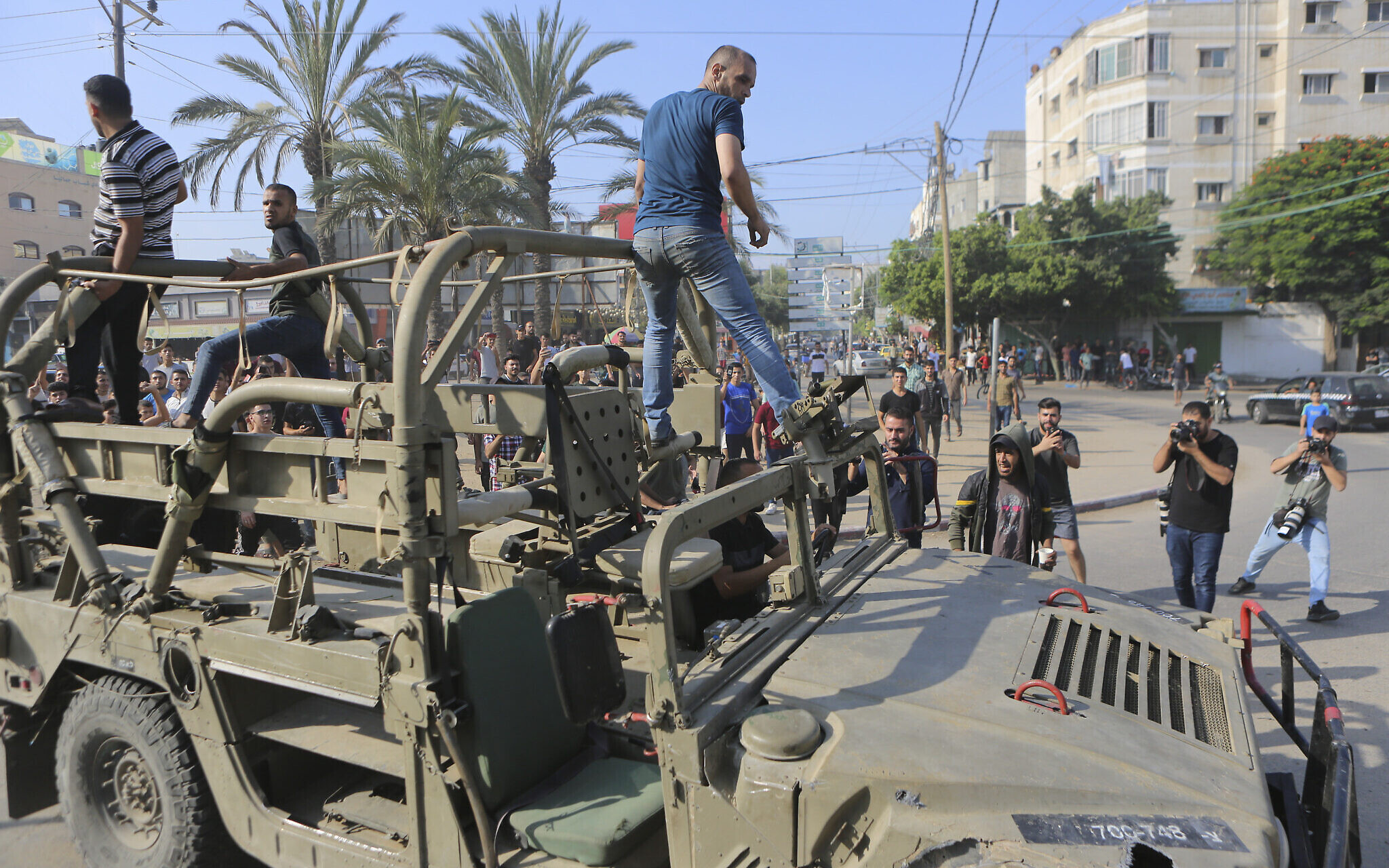
Amir Avivi, a retired Israeli general, said that without a foothold inside Gaza, Israel’s security services have come to rely increasingly on technological means to gain intelligence. He said terrorists in Gaza have found ways to evade that technological intelligence gathering, giving Israel an incomplete picture of their intentions.
“The other side learned to deal with our technological dominance and they stopped using technology that could expose it,” said Avivi, who served as a conduit for intelligence materials under a former military chief of staff. Avivi is president and founder of Israel Defense and Security Forum, a hawkish group of former military commanders.
“They’ve gone back to the Stone Age,” he said, explaining that terrorists weren’t using phones or computers and were conducting their sensitive business in rooms specially guarded from technological espionage or going underground.
But Avivi said the failure extends beyond just intelligence gathering and Israel’s security services failed to put together an accurate picture from the intelligence they were receiving, based on what he said was a misconception surrounding Hamas’s intentions.
Israel’s security establishment has in recent years increasingly seen Hamas as an actor interested in governing, seeking to develop Gaza’s economy and improving the standard of living of Gaza’s 2.3 million people. But Avivi and others say the truth is that Hamas, which openly calls for Israel’s destruction, sees that aim as its priority.
Israel in recent years has allowed up to 18,000 Palestinian laborers from Gaza to work in Israel, where they can earn a salary about 10 times higher than in the impoverished coastal enclave. The security establishment saw that carrot as a way to maintain relative calm.
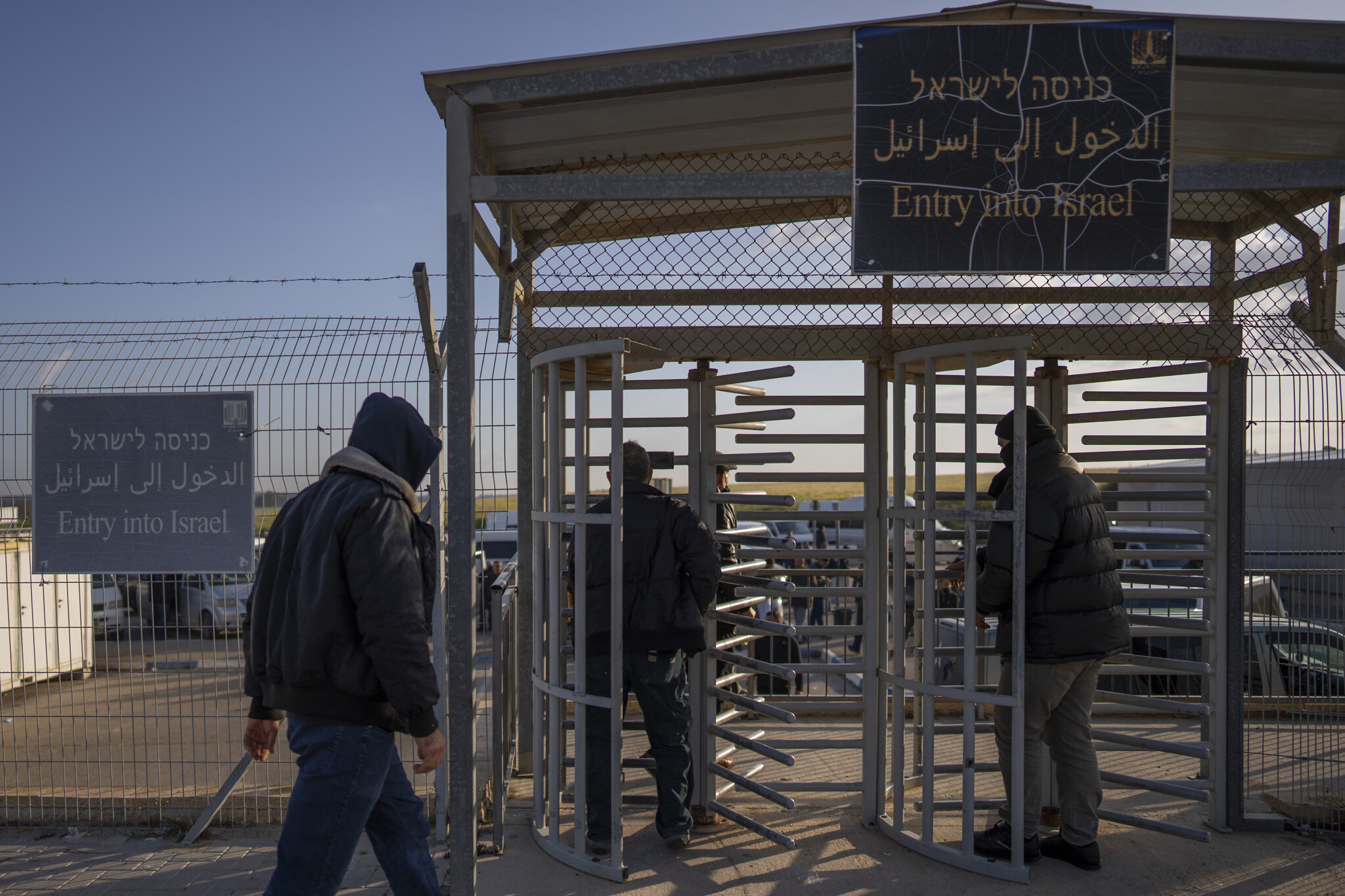
“In practice, hundreds if not thousands of Hamas men were preparing for a surprise attack for months, without that having leaked,” wrote Amos Harel, a defense commentator, in the daily Haaretz. “The results are catastrophic.”
Israel has also been preoccupied and torn apart by Netanyahu’s judicial overhaul plan. Netanyahu had received repeated warnings by his defense chiefs, as well as several former leaders of the country’s intelligence agencies, that the divisive plan was chipping away at the cohesion of the country’s security services.
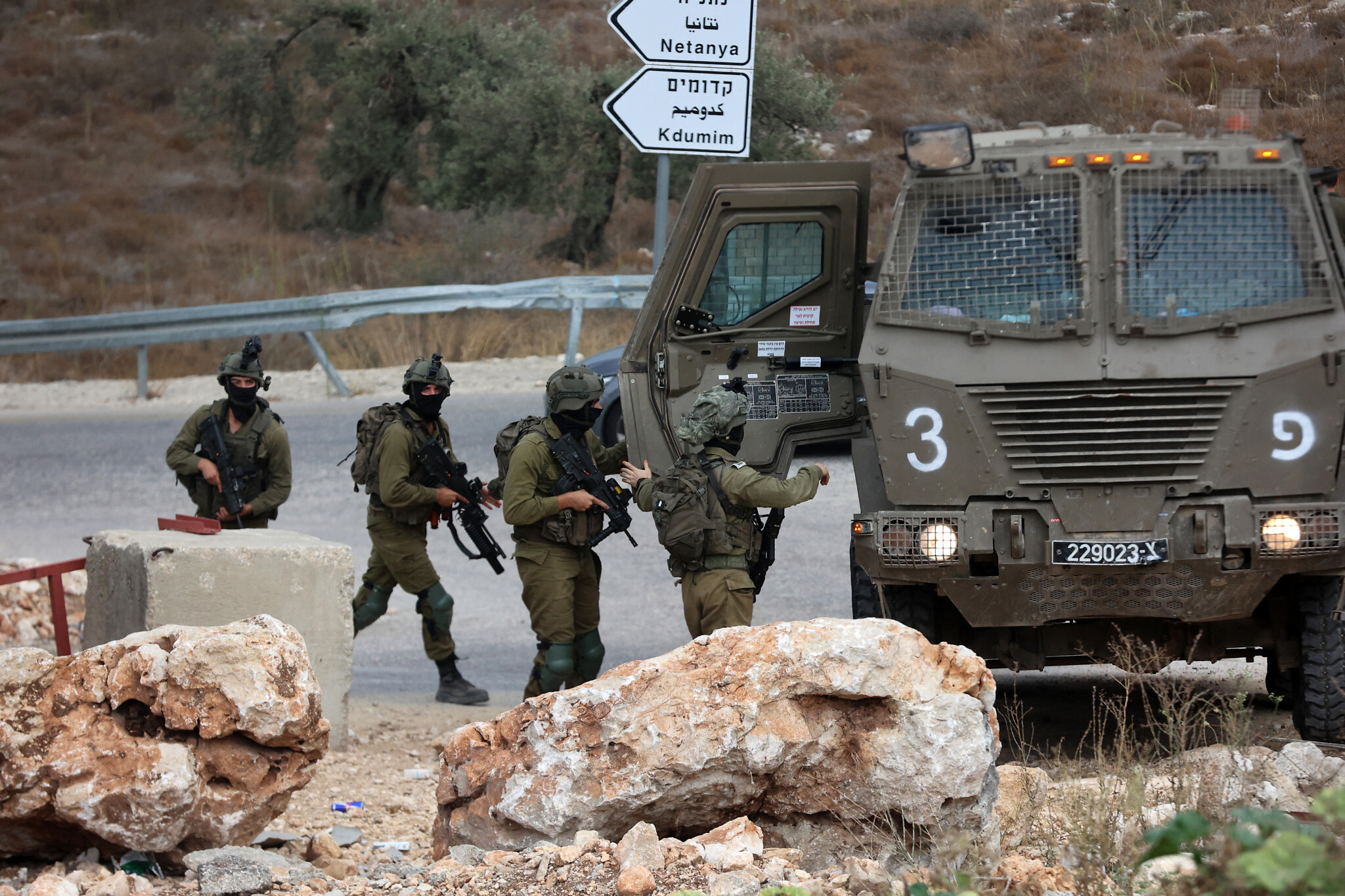
Martin Indyk, who served as a special envoy for Israeli-Palestinian negotiations during the Obama administration, said internal divisions over the legal changes was an aggravating factor that contributed to the Israelis being caught off guard.
“That roiled the IDF in a way that was, I think, we discovered was a huge distraction,” he said.
Times of Israel staff contributed to this report.
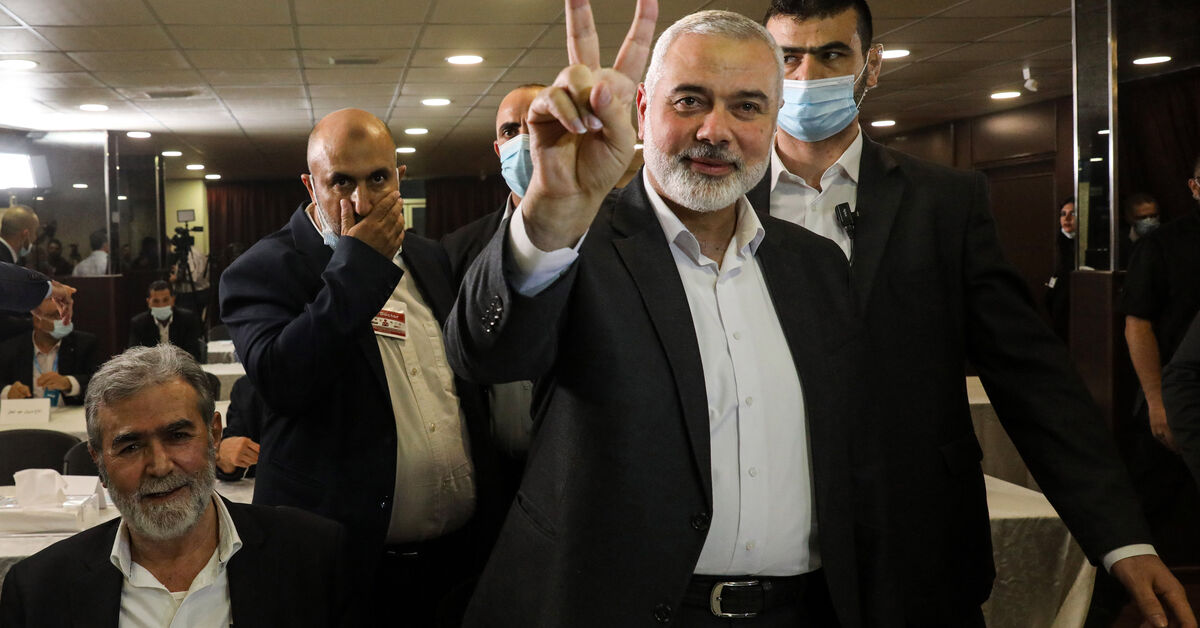
The Palestinian armed group Hamas said on Tuesday that it sent a high-level delegation to Russia and held talks with Russian Foreign Minister Sergey Lavrov.
In an interview published on Hamas’ website, Saleh al-Arouri, deputy head of Hamas’ political bureau, said party leaders visited Russia and met Lavrov and that the visit was a reflection of Hamas’ weight among major global powers.
"The leadership of the movement visited Moscow and met Sergey Lavrov. It was an important visit that highlights the role of the movement with many global actors," Arouri said. He added that there might be another international Hamas trip "in the coming weeks." Arouri did not specify when the visit to Moscow took place, saying only that it happened "recently."
Commenting on the increasing Israeli attacks against Palestinians ahead of the Muslim holy month of Ramadan, Arouri said the movement’s “patience is running out.”
Israeli-Palestinian tension has been rising in the West Bank as Israeli raids have intensified, leading to US warnings about the security situation. Israel has accused several West Bank groups including the Lion’s Den of being backed and funded by Hamas.
Meanwhile, Russian-Hamas relations have steadily grown. Russia has sought to increase its role in the Palestinian reconciliation dossier, with some Palestinians hoping it will break the US monopoly over the file that has been stalled for more than a decade.
Hamas officials have made several visits to the Russian capital, most recently in September of last year.
Moscow’s public support for Hamas also comes as its relations with Israel soured following its invasion of Ukraine last year. Israel has maintained a cautious stance in the war, but Israeli Foreign Minister Eli Cohen’s February visit to Kyiv marked a small shift as Israel grows more concerned about Moscow-Tehran military cooperation and the use of Iranian drones in Ukraine.

As the war with Hamas enters the third day, the Israeli military is still fighting terrorists in Israeli towns along the border with Gaza. At least 700 Israelis were killed and nearly 2,400 wounded since Hamas' surprise invasion on Saturday morning. In Gaza, the Palestinians report 493 dead and 2,751 wounded
The IDF spokesman announced that the Air Force attacked strategic centers belonging to Hamas and Islamic Jihad in Gaza.
According to the army's statement, a military warehouse and an entrance shaft to an underground tunnel used by senior members of the Hamas organization were bombed, and Islamic Jihad headquarters in a mosque in the Zeitoon neighborhood and the headquarters of Hamas in Khan Younes.
A barrage of rockets were fired from Gaza towards Israel at roughly 12:00 P.M. local time. Sirens sounded in dozens of cities, including Jerusalem and the greater Tel Aviv area.
One rocket fell on Highway 1 in an open area, no injuries were reported.
Ukrainian President Volodymyr Zelenskyy took to Twitter on Monday to condemn the deadly attack against Israel.
"No one can forget what terrorists did in Israel. Thousands of missiles against peaceful cities. Shot civilian cars. Men, women, and children. No one was spared. Streets in blood. Hostages. The terrorists themselves shared the footage of their atrocities and were proud of them," he wrote.
Lebanon's Foreign Minister Abdallah Rashid Bouhabib, said his government had received assurances from Hezbollah that it would not intervene in the fighting.
Bouhabib spoke to the Al-Sharq al-Awast newspaper on Saturday, before Hezbollah announced that it had attacked Israeli positions in the Mount Dov area Sunday morning.
According to Bouhabib, Hezbollah pledged not to intervene unless "Israel bullies and harasses Lebanon."
Hungary is currently evacuating 110 more people from Israel, bringing the total number of people it has brought out of the country to 325 including 46 children, Foreign Minister Peter Szijjarto said in a Facebook post on Monday.
He said that 15 of the 325 evacuees were foreign citizens, among them Israeli, Swedish, Austrian, German, British and Portuguese nationals. Szijjarto said the latest flight, the third it has organized, was currently en route to Budapest.
IDF Spokesperson Daniel Hagari said that "Control has been achieved in all the communities, but there may still be terrorists in the area. Tanks and aircraft will secure the breaches in the border, we have almost completed evacuating Gaza border residents, however, Sderot will not be evacuated yet."
Hagari added that 300,000 army reservists have been called up making it the "biggest, fastest ever" draft in Israel's history. Additionally, he confirmed that 4,400 rockets have been fired from Gaza into Israel.
The Chinese news agency Xinhua reported that Qatar is trying to lead a quick prisoner exchange deal between Israel and Hamas.
A Hamas source told the news agency that the Qatari proposal involves the release of women held by Hamas in exchange for the release of female Palestinian prisoners held in Israel. According to the report, the U.S. supports the initiative and Hamas has expressed agreement in principle on the condition that all Palestinian female prisoners held in Israel be released.
Nepal said on Monday at least 10 of its nationals were killed in Israel after the attack by Palestinian group Hamas, and the cabinet will hold an emergency meeting to discuss how to evacuate thousands of others working and studying there.
The foreign ministry said four Nepalis were also wounded in Saturday's attack, and media reports said many others were hiding in bunkers. Prime Minister Pushpa Kamal Dahal has convened a special cabinet meeting to discuss ways to get citizens back home, his office said on Monday.
"Arrangements are being made to evacuate Nepali nationals who want to return home from Israel," the foreign ministry said late on Sunday. Officials say about 4,500 Nepalis work in Israel, mostly as caregivers, and more than 100 are studying there under an "earn and learn" program.
The British government said it had updated its travel advice for Israel and the Occupied Palestinian Territories, advising against all but essential travel as fighting continued near Gaza after a bloody incursion by gunmen from Islamist group Hamas.
Britain already advised against all travel to Gaza, but on Sunday also added several areas in Israel close to the border with Gaza to that recommendation, and changed its advice for the country as a whole.
The British Foreign Office also asked all British citizens in Israel and the Occupied Palestinian Territories to register their presence there, so they can be kept updated of further changes to travel advice.
Finance Minister Bezalel Smotrich released a statement saying that "Reality dictates that unity and cohesion are what's needed to defeat our enemies. Leave behind teams and leave negotiations. I call on Prime Minister Netanyahu and Benny Gantz to rise to the occasion, meet immediately and agree on the establishment of a national emergency government that will unite the people, raise the spirit, provide full support to the IDF and bring about the complete elimination of Hamas and the terrorist organizations in Gaza."
"Israel is at war and this is the time for a national unity government. At such a complex time we must put our differences aside and unite against the enemy who wants to destroy us," Economy and Industry Minister Nir Barkat said on Monday.
"IDF fighters from all parts of Israeli society are going to battle for the State of Israel and we must back them up with a unity government that will represent the entire people. We must establish a unity government today and win the war together," he added.
The Israeli army believes that large amounts of Hamas militants are continuing to make their way into Israel, and some of the Israeli towns along the border with Gaza continue to be an active battlefield
The IDF is conducting searches along the border fence and other points through which Hamas militants are entering Israel.
Lt. Col. Eli Ginsburg, 42
Staff Sgt. Naveh Eliazar Lax, 21
Staff Sgt. Tashgar Taka, 21
2nd Lt. Yonatan Gutin, 19
Cpl. Adir Taher, 19
2nd Lt. Nitai Omer, 22
Cpl. Amit Tzur, 19
Staff Sgt. Yosef Itamar Bruchim, 20
Cap. Roey Negri, 28
Maj. Peleg Salem, 30
Sgt. Yaron Uri-Shai, 21
Sgt. Ben Rubinstein, 20
1st. Lt. Itai Cohen, 22
Cpl. Ilar Bar-Sadeh, 19
Staff Sgt. Orel Moshe, 21
Pvt. Lior Levy, 19
>>>Israel's dead: Civilians, soldiers, emergency services personnel killed in war with Hamas<<<
The Israeli Health Ministry announced Monday morning that 2,382 wounded have been evacuated to hospitals, 22 of the injured are in critical condition and 345 of them are in serious condition.
National Security Minister Itamar Ben-Gvir said Monday that his party would welcome a broad emergency government, "As long as the basis for entering the government is an agreement that the government's goal is defined as the IDF's absolute victory that the government will define for the IDF is absolute victory and crushing of Hamas' military and government."
The IDF announced that it attacked 500 Hamas and Islamic Jihad targets in the Gaza Strip Sunday night, and that since the beginning of the war more than 1,100 targets in the Gaza Strip have been attacked. Among other things, eight Hamas and Islamic Jihad headquarters were bombed overnight, a building where the Hamas naval force was active, three tunnels in the Beit Hanun area and a mosque where Hamas was operating.
Palestinians report numerous fatalities and difficulty evacuating casualties. "I've been through all the fighting since 2007, we've never seen anything like this – indiscriminate destruction," a Gaza resident told Haaretz. "Whole buildings and houses have collapsed and it is estimated that at least dozens are stuck under the rubble. It seems that there is no red line, as if the entire strip is a bank of targets and every building is a target."
Thailand's foreign ministry on Monday said 12 Thai nationals had been killed in unrest in Israel, plus 11 more kidnapped and eight injured.
"We are working to help all Thai citizens in Israel," Foreign Ministry spokesperson Kanchana Patarachoke told reporters.
The IDF announced that Israeli soldiers killed a tractor driver who attempted to carry out a ramming attack Monday morning at a military checkpoint between Hebron and Kiryat Arba in the West Bank.
According to the army's statement, the terrorist launched a live broadcast on social media while on his way to the area, and was shot by IDF soldiers.
IDF forces fought against 70 terrorists around Kibbutz Be'eri, the IDF spokesman announced Monday morning, adding that they suspect that there is a tunnel in the area.
Israel continues to fight for a third day since the deadly assault on southern communities by Gaza terrorists and release those held hostage in their homes as the numbers of dead, wounded, and captured continue to be released.
Israeli forces are working to remove the remaining Gaza militants who infiltrated into border communities as the army reports successful strikes on hundreds of military targets in the Gaza Strip.
A Hamas senior official released a statement saying they have over 100 Israeli hostages are being held in Gaza Strip, while Islamic Jihad said they hold at least 30 Israelis hostage.
Prime Minister Benjamin Netanyahu and senior opposition member Benny Gantz are scheduled to meet on Monday morning to discuss entering a coalition war government.
Editorial |
Oct 8, 2023
Get email notification for articles from Haaretz Editorial Follow
Oct 8, 2023
The disaster that befell Israel on the holiday of Simchat Torah is the clear responsibility of one person: Benjamin Netanyahu. The prime minister, who has prided himself on his vast political experience and irreplaceable wisdom in security matters, completely failed to identify the dangers he was consciously leading Israel into when establishing a government of annexation and dispossession, when appointing Bezalel Smotrich and Itamar Ben-Gvir to key positions, while embracing a foreign policy that openly ignored the existence and rights of Palestinians.
Hamas's attacks on Israel, which began Saturday morning, were planned weeks in advance with assistance from Iranian security officials, according to a Sunday report from The Wall Street Journal.
The report, citing senior members of Hamas and Hezbollah, stated that the Iranian officials "gave the green light" for the attacks during a meeting between them and Hamas in Beirut last week.
IRGC officers worked with Hamas since August to plan incursions from the "air, land, and sea," the report noted. Officers of Iran’s Islamic Revolutionary Guard Corps were also at the meetings in Beirut.
Iran’s supreme leader, Ayatollah Ali Khamenei, had praised the attacks, posting on X earlier this week that the cancer of the usurper Zionist regime will be eradicated at the hands of the Palestinian people and the Resistance forces throughout the region." Formerly known as Twitter, X stated that Khamenei's post violated the platform's rules.
At least 700 Israelis were killed and around 2,300 injured in attacks by Hamas since Saturday morning, with the number expected to rise.
Iran's Supreme Leader Ayatollah Ali Khamenei speaks during a meeting with the guests of the Islamic Unity Conference in Tehran, Iran October 3, 2023. (credit: Office of the Iranian Supreme Leader/WANA/Handout via Reuters)Hours earlier, Hamas spokesman Ghazi Hamad told the BBC that the terrorist group had direct backing and support from Iran, which also promised it would "stand by the Palestinian fighters until the liberation of Palestine and Jerusalem," the report quoted him as saying.
This is a developing story.

The Prime Minister's Office issued the statement following reports that Netanyahu excluded National Security Minister Ben-Gvir from a sensitive security discussion
Get email notification for articles from Jonathan Lis Follow
Oct 1, 2023
Israeli Prime Minister Benjamin Netanyahu said on Sunday that any attempt to cause friction between him and National Security Minister Itamar Ben-Gvir is "false and done purposefully."
 image/webp 1123670.jpg
image/webp 1123670.jpg



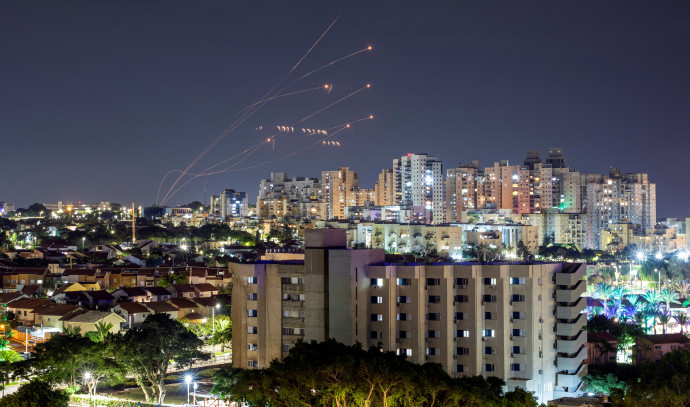


Comments
Post a Comment